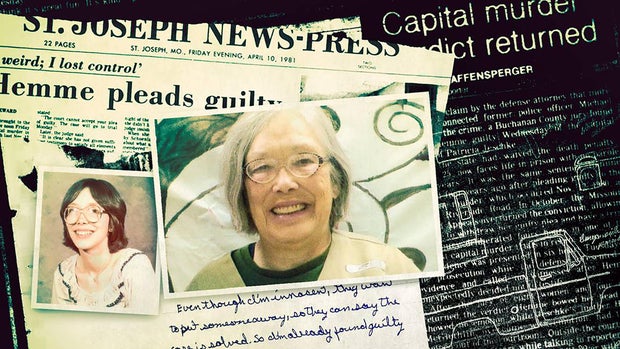CBS News
Missouri Supreme Court clears way for release of woman imprisoned for library worker’s 1980 murder

The Missouri Supreme Court has cleared the way for the release of a Missouri woman whose murder conviction was overturned after she served 43 years in prison, but she still remained in custody as of Thursday evening.
Sandra Hemme’s lawyers say Republian Attorney General Andrew Bailey’s Office’s is disregarding the ruling and is directing the Department of Corrections not to release Hemme, CBS affiliate KCTV reported.
A circuit court judge ruled last month that Hemme’s attorneys showed evidence of her “actual innocence,” and an appeals court ruled she should be freed while her case is reviewed.
But Hemme’s immediate freedom has been complicated by lengthy sentences she received for crimes she committed while behind bars – a total of 12 years, which were piled on top of the life sentence she received for her murder conviction.
Neil Nakahodo/The Kansas City Star/Tribune News Service via Getty Images
Bailey took his fight to keep her locked up to the state’s highest court, but her attorneys argued that keeping her incarcerated any longer would be a “draconian outcome.”
Her release appeared imminent after the Missouri Supreme Court refused to undo lower court rulings that allowed her to be released on her own recognizance and placed in the custody of her sister and brother-in-law in the Missouri town of Higginsville.
No details have been released on when Hemme will be freed. One of her attorneys, Sean O’Brien, filed a motion Thursday asking that a judge “hold an emergency status conference at the earliest possible time” and order Hemme’s release.
Hemme’s lawyers, in an emailed statement to The Associated Press, said her family “is eager and ready to reunite with her, and the Department of Corrections should respect and promptly” release her.
Hemme, now 64, had been serving a life sentence at a prison northeast of Kansas City after she was twice convicted of murder in the death of library worker Patricia Jeschke.
She’s been the longest-held wrongly incarcerated woman known in the U.S., according to her legal team at the Innocence Project.
“This Court finds that the totality of the evidence supports a finding of actual innocence,” Circuit Court Judge Ryan Horsman concluded after an extensive review.
Horsman noted that Hemme was heavily sedated and in a “malleable mental state” when investigators repeatedly questioned her in a psychiatric hospital. Her attorneys described her ultimate confession as “often monosyllabic responses to leading questions.” Other than this confession, no evidence linked her to the crime, her trial prosecutor said.
“Police exploited her mental illness and coerced her into making false statements while she was sedated and being treated with antipsychotic medication,” the Innocence Project said. “The only evidence that ever connected Ms. Hemme to the crime was her own unreliable and false confessions: statements taken from her while she was being treated at the state psychiatric hospital and forcibly given medication literally designed to overpower her will.”
The St. Joseph Police Department, meanwhile, ignored evidence pointing to Michael Holman – a fellow officer, who died in 2015 – and the prosecution wasn’t told about FBI results that could have cleared her, so it was never disclosed before her trials, the judge found.
“This Court finds that the evidence shows that Ms. Hemme’s statements to police are so unreliable and that the evidence pointing to Michael Holman as the perpetrator of the crime so objective and probative that no reasonable juror would find Ms. Hemme guilty,” Horsman concluded in his 118-page ruling. “She is the victim of a manifest injustice.”
CBS News
What we know about the suspect in deadly car crash at German Christmas market

Watch CBS News
Be the first to know
Get browser notifications for breaking news, live events, and exclusive reporting.
CBS News
House begins debate on new funding bill after previous vote failed

Watch CBS News
Be the first to know
Get browser notifications for breaking news, live events, and exclusive reporting.
CBS News
Here’s how much more it will cost to heat your home this winter

Americans are expected to spend more money heating their homes this winter than on holiday gifts, according to new research.
The elevated cost of staying warm indoors amid cold outdoor temperatures comes after an unusually hot summer, that led to households spending bigger shares of their budgets on cooling costs, compared with previous years, according to a report from the National Energy Assistance Directors Association (NEADA).
On average, spending on home heating this winter is projected to increase by 8.7% to $941, up from $866 last winter. The increased costs are attributed in part to both expected colder temperatures in the Northeast and Midwest states.
The new average expenditure on heating costs outpaces the $902 the average household is expected to spend on Christmas presents this year, according to a forecast from the National Retail Federation.
What’s driving up home heating costs?
There are different ways to keep residences warm. Families that use electricity to heat their homes are expected to face the largest increase in costs — more than 14% — which will bring the total up to $1,189 from $1,040 from mid-November through mid-March, which NEADA considers to be the winter period.
Driving up prices is the rising cost of updating and maintaining the electric grid. Plus, colder weather is expected to lead to increased consumption.
“It’s colder, and the cost of electricity is up as the grid is rebuilt. So we’re seeing both higher prices and greater usage,” NEADA Executive Director Mark Wolfe told CBS MoneyWatch.
Natural gas, propane and heating oil cost differences
Natural gas and propane users are also expected to be hit with bigger bills this winter. Heating costs for natural gas are up just over 3%, for an average cost of $634 for the winter period, compared with $615 for 2023-2024. Costs are expected to rise only modestly in line with wholesale prices.
Propane costs are up 4.4%, with families expected to spend an average of $1,231 heating homes, up from $1,179 last season.
Heating oil costs, by contrast, have declined 2.7%, which means average spending this winter will be $1,518, down from $1,560 last winter.
Early start to the season
November was colder than usual, with temperatures dropping prematurely after a “very expensive summer” of heat waves straining cooling resources, said Wolfe.
Blame climate change for the big swings in temperature, he added.
“Weather conditions can be very unpredictable even though over time, winters are getting warmer and summers are getting hotter. It’s not a straight line, and for consumers, it’s quite upsetting because higher utility bills are coming right before Christmas,” Wolfe said.
Steps to take now
There are steps consumers can take to help keep a lid on home heating costs.
Wolfe urges people to have their thermostats serviced now, before the coldest temperatures of the season roll in. That way, families won’t be on the hook for an emergency repair if their thermostat breaks in the middle of a cold front. A tune-up will also help heating systems run more efficiently, he said.
Always close the furnace flue, or else it will lead heat outside the house, advises Wolfe. Lastly, manually turn down the heat at night, if you can, to save up to 10% on your energy bill.









